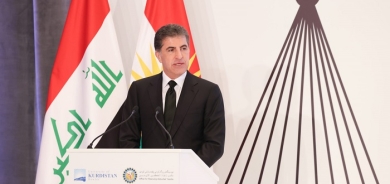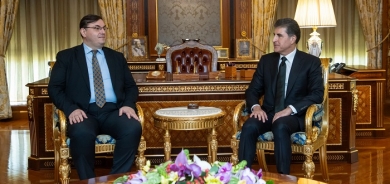Cameron walks tightrope on Britain’s EU future

With the UK set to vote on whether or not to stay in the EU in a 2017 referendum, Cameron sent his strongest warning yet that if the negotiations fail and Britain votes to leave the union, there will be no turning back.
“If we vote to leave, then we will leave,” he said as he outlined his renegotiation demands in a speech at the London headquarters of Chatham House, an international affairs think tank.
“There will not be another renegotiation and another referendum. So I say to my European counterparts with whom I am negotiating, this is our only chance to get this right - for Britain and for the whole European Union.”
It was, for the most part, “a good political pitch”, according to Thomas Raines, research associate for Europe at Chatham House.
“However, what it does mean is that the negotiations risk now becoming the centre piece of the UK’s referendum on Europe,” he told FRANCE 24.
Those negotiations will centre on four key areas that Cameron had already outlined in the past.
The British Prime Minister demanded financial and economic safeguards for countries that do not use the euro single currency, a reduction to the burden of EU regulations on businesses, for Britain to be excluded from the EU’s commitment to greater integration and curbs on some benefits for EU migrants.
‘Problematic’
It is this final demand that is likely to cause the most difficulty for Cameron. The UK Prime Minister said he wanted to see migrants from other EU member states arriving in Britain to be barred from receiving certain benefits until after they had been working in the country for four years.
This proposal is unlikely to go down well in many eastern European countries, such as Poland, whose citizens make up many of the EU migrants living in the UK.
It also goes against one of the EU’s most cherished principals, that of the free movement of people and labour.
Immediately after Cameron’s speech, the European Commission’s chief spokesman Margaritis Schinas described this demand as “highly problematic”, as it entailed “direct discrimination between EU citizens”.
But otherwise, Cameron’s speech was largely an exercise in striking a careful balance between demanding too much and too little. His wish list of reforms needed to be enough to placate British Eurosceptics, without going so far as to make them unacceptable to other EU members.
Cameron’s demand that Britain be excluded from a stated EU mission of moving towards an “ever closer union”, for example, may present some technical and legal challenges. But it would not substantially alter the workings of the EU or Britain’s role in it – it is not a legally binding clause and one frequently ignored by the UK and others.
Changing it, therefore, should not upset too many of Cameron’s EU partners, even if there is some resistance, but it would be a significant symbolic win for Cameron.
He has also left himself plenty of wriggle room on the immigration issue. A letter sent by Cameron after his speech to the EU European Council President Donald Tusk made it clear that the demand over benefits to EU immigrants was open to negotiation.
‘Balancing act’
Given himself a reasonable chance of succeeding in the negotiations is a sensible strategy by Cameron, who is already, some may say, playing with fire by staking the UK's future in Europe on their success.
Cameron has said he wants the UK to stay in Europe, but should the negotiations fail, it would make it much harder, or perhaps even impossible, for him to campaign for that outcome in the referendum.
Even as Cameron was firing warning shots over Britain’s European future, he was keen to stress the economic and national security benefits of EU membership to the UK.
“Those who advocate Britain leaving need to explain how the league of 1 will compare with the league of 28,” he said.
“Negotiating as part of an economy with 500 million people gives us more power as a country, not less.”
Reaction from other EU leaders came thick and fast.
German Chancellor Angela Merkel was quick to signal her country’s willingness to work with Cameron to reach a deal.
“I spoke with him [Cameron] by telephone yesterday. I know of the demands, so what is on the table now is no surprise. We want to take a solution-orientated approach to dealing with these proposals,” she said. “There are some difficult points, and some less difficult points. But if one has a spirit of wanting to solve this then I have a certain confidence that this can work out.”
But in a view likely to be shared by many other eastern European countries, Czech Prime Minister Bohuslav Sobotka warned any changes to free movement in the EU would cause a “very serious problem”.
“The right to live and work anywhere in the EU is absolutely fundamental to us given our historical experience,” Sobotka said in a statement.
Hardline Eurosceptics were quick to voice their displeasure at a list of demands they saw as not going nearly far enough, with Nigel Farage, the leader of the UK Independence Party, saying Cameron was not aiming for anything “substantial”.
But, noted Raines, “there are people, including those on the backbenches of the Conservative party, who would never be happy with any changes to the EU that would be reasonable”.
Instead Cameron’s speech, he said, was “a clear balancing act, designed to appeal to ‘persuadable’ Eurosceptics, while presenting manageable proposals, aware of the difficulty of getting 27 other member states to approve the changes”.
“There will be a general willingness among EU leaders to make sure Cameron gets what he asked for,” he added.
France24















